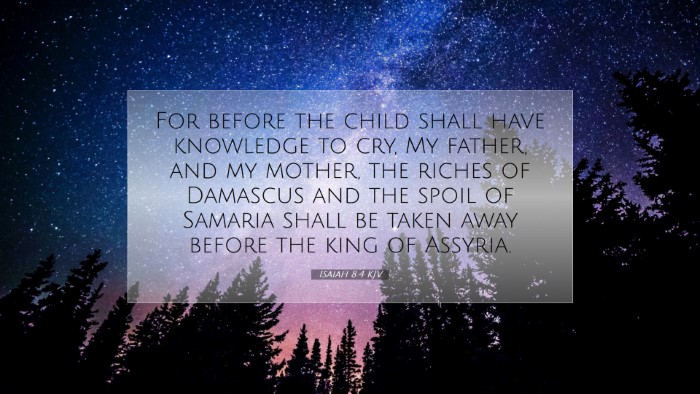Commentary on Isaiah 8:4
Verse: "For before the child shall have knowledge to cry, My father, and my mother, the riches of Damascus and the spoil of Samaria shall be taken away before the king of Assyria." (Isaiah 8:4, KJV)
Introduction
This verse is part of a prophetic message delivered by Isaiah, wherein he addresses the impending judgment upon Israel and the significance of trust in God amidst turmoil. It encapsulates a pivotal moment in Israeli history where the influence of Assyria loomed large over the northern kingdom. The interpretation of this verse must take into consideration the historical context, the richness of its symbolism, and the ultimate theological implications.
Contextual Background
Isaiah prophesied during a turbulent period marked by national distress, arising from threats by neighboring nations. The kingdom of Judah, infused with fear and doubt regarding its future security, needed assurance of God’s control over worldly affairs. This verse constitutes part of a larger passage that utilizes the imagery of a child to depict the nativity of prophetic fulfillment and divine guidance.
Historical Setting
- The Northern Kingdom of Israel was engaged in conflicts with neighboring nations, including Syria (Damascus) and Assyria.
- Isaiah often speaks of a historical moment set for judgment, warning Israel of impending doom unless they return to faithfulness.
- The socio-political environment further complicates matters as an influence of worldly alliances threatened the people’s reliance on Yahweh.
Exegesis of Isaiah 8:4
This verse utilizes a child as a metaphor, pointing to the imminent arrival of an event that will cause the fortunes of Israel and Damascus to be dramatically reversed.
Key Themes
- The Time Constraint: The phrase "before the child shall have knowledge" suggests a swift fulfillment of prophecy. It emphasizes the imminent timeline of judgment that God has ordained.
- The Names of Parents: The idea of knowing "My father and my mother" communicates foundational human recognition, stressing a phase of innocence and development — a metaphor for Israel's spiritual immaturity and need for guidance.
- Judgment on Nations: The text underscores the impending judgment on both Damascus and Samaria, projecting the sovereignty of God over nations and a reassurance of divine authority.
Theological Reflections
Theologically, Isaiah 8:4 conveys the theme of divine providence amidst chaos. It reflects the nature of God as one who has ultimate control over geopolitical events. This assertion is particularly significant for contemporary reflections on divine sovereignty in the face of oppressive regimes or daunting circumstances.
Public Domain Commentaries Insights
Matthew Henry
Henry elaborates on the immediateness of the prophecy. He notes that before a child reaches the age of discernment, notable changes will occur where the riches of prominent nations will be stripped away. He emphasizes God’s predominance, suggesting that the tribulations faced by Israel will culminate in their enemies being brought low.
Albert Barnes
Barnes elaborates on the metaphor of the child, positing that this imagery refers to the quick unfolding of God's judgment against foreign adversaries. He further explains that the mention of "riches" reflects the economic vulnerabilities resulting from warfare and divine intervention. The promised judgment serves to remind Israel of their reliance on God rather than political alliances.
Adam Clarke
Clarke articulates how the prophecy emphasizes a specific timeframe for God’s work — a time when even the youngest in society will perceive change. He regards this as a significant assurance to the faithful that God’s will shall unfold precisely as intended. Clarke's commentary brings forth the importance of trusting in God’s promises as Israel faces inevitable changes.
Application for Today
The prophetic message in Isaiah 8:4 speaks profoundly to modern congregations and individuals facing uncertainty. The verse encourages faith in God's divine timing and authority. It serves as a reminder that even in seemingly dire contexts, God’s mechanisms of judgment and protection operate with perfect wisdom and speed.
- Encouragement in Trials: Believers today can find comfort in knowing that God is never detached from the unfolding of events in their lives and the world.
- Trust in Divine Sovereignty: This passage reinforces the call to place trust in God rather than human institutions or alliances.
- Recognition of Divine Timing: The assurance that God fulfills His promises in His time is central to our understanding and faith.
Conclusion
Isaiah 8:4 serves as a crucial affirmation of God’s presence and providence during periods of conflict. The layered meanings of the child’s growth and the foretelling of socio-political upheaval invite readers to engage deeply with the nature of faith and prophecy. As pastors, students, theologians, and scholars reflect on this verse, may it inspire renewed trust in God’s sovereignty and mercy, assuring us that His plans are always for the ultimate good of His people.


